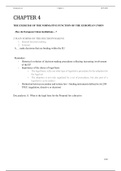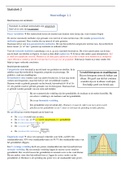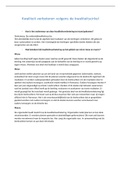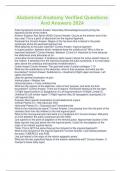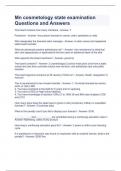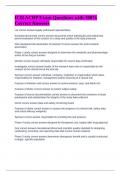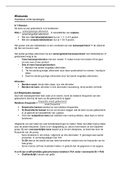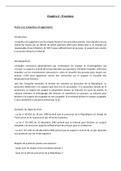Philosophy in Action assignment
Eva Lugard – i6235581 (06-02-2022)
Chosen topic: Organs for transplantation Gift or Contribution?
Introduction of the case and gut feelings
In many countries in the world, waiting lists for donor-organs are so long that many people
die waiting for an organ transplantation. This has arisen a discussion about whether an
opting-out system (you are a donor, unless you register your choice not to be) should be
implemented instead of an opting-in system (you are only a donor if you register your choice
to be). As stated in McIntosh (2014), an opt-in system can lead to people who want to donate
but don’t (false-negative), while an opt-out system can lead to people who do not want to be a
donor donating (false-positive).
This discussion reminds me of the time I debated this topic in high school when the
Dutch system changed from an opt-in to an opt-out system in 2020 (Ministerie van Algemene
Zaken, 2021). We talked about how in theory, an opt-out system would benefit society better
than an opt-in system, because more people would donate and still everyone would get the
chance to opt out if they would not want to donate. However, there are more side-tracks
connected to this topic than one might think.
To start, we discussed people who might not be informed about the fact that they have
a possibility to register their choice or might not be informed about the fact that the opt-out
system has been implemented. Even though there have been many campaigns, flyers etc.
about the new system (for example the video ‘Donor’ by ‘Ministerie van Volksgezondheid,
Welzijn en Sport’ that was on television for numerous weeks), there will still be people who
are not completely informed about the functioning of the system.
Secondly, the system that is being used in a country influences the way people think
about organ donation. For example, an opt-in system might make people think of organ
donation as an exceptional service that one might provide; a service that is not considered
‘normal’. On the other hand, an opt-out system might make people think of organ donation as
‘normal’, and something you only opt out of when you have very good and specific reasons.
This raises the question of whether we want to influence people in their choice, and if one of
the two systems is more influential than the other.
, I personally remember registering my own choice to be a donor. On television, I had
seen a government campaign about the possibilities and way to register to become a donor
and decided to do so right away. I did this because I was sure about my choice and had no
trouble finding out how to register. However, I also remember talking to many friends of
mine who were either not informed about the system, did not know what choice they wanted
to make or did not know how to register. This made me think about the fact that people might
encounter different obstacles in their path to becoming or not becoming a donor, which I had
not realized before.
I am convinced that the science concerning organ transplantation will develop
massively over the next decades. I therefore think that the subject will play a great role in my
prospective discipline (Policy, Management and Evaluation of Healthcare) and that I will
deal with this subject numerous times in my career.
Reflection about justice
Analyzing this topic brings up many questions about which of the two systems is the most
just. To analyze this, we use the concepts spoken of by Parks & Wike (2010) and Rawls
(2001).
Jennifer Parks and Victoria Wike are professors of philosophy at Loyola University
Chicago (Loyola University Chicago, 2021). In their article from 2010, they write about the
fact that everyone has certain rights and duties. Among other things, they write about this in
the light of the social contract. The social contract is a hypothetical ‘contract’ between a state
and its citizens. Citizens give up a part of their freedom, in exchange for protection by the
state. Looking at these rights and duties in the context of organ donation, we highlight Article
11 from the Dutch constitution. This Article ensures the right to integrity over one’s own
body, even after death. With this right in mind, one could argue that it is not justified to use
someone’s organs for donation when they have not registered their choice to be or not to be a
donor. However, I think that with this right to integrity, also come duties connected to this
right. In this case, I think that people who are not willing to be an organ donor have the
obligation to – if they are able to do so – undertake the action to register this choice.
However, there will always be certain groups that are not able to do so, for example because
they are not aware of the system change (opt-out to opt-in) or do not have the abilities to
make a well-informed choice and register this choice. These groups bring us to another
concept, which was introduced by John Rawls.
Eva Lugard – i6235581 (06-02-2022)
Chosen topic: Organs for transplantation Gift or Contribution?
Introduction of the case and gut feelings
In many countries in the world, waiting lists for donor-organs are so long that many people
die waiting for an organ transplantation. This has arisen a discussion about whether an
opting-out system (you are a donor, unless you register your choice not to be) should be
implemented instead of an opting-in system (you are only a donor if you register your choice
to be). As stated in McIntosh (2014), an opt-in system can lead to people who want to donate
but don’t (false-negative), while an opt-out system can lead to people who do not want to be a
donor donating (false-positive).
This discussion reminds me of the time I debated this topic in high school when the
Dutch system changed from an opt-in to an opt-out system in 2020 (Ministerie van Algemene
Zaken, 2021). We talked about how in theory, an opt-out system would benefit society better
than an opt-in system, because more people would donate and still everyone would get the
chance to opt out if they would not want to donate. However, there are more side-tracks
connected to this topic than one might think.
To start, we discussed people who might not be informed about the fact that they have
a possibility to register their choice or might not be informed about the fact that the opt-out
system has been implemented. Even though there have been many campaigns, flyers etc.
about the new system (for example the video ‘Donor’ by ‘Ministerie van Volksgezondheid,
Welzijn en Sport’ that was on television for numerous weeks), there will still be people who
are not completely informed about the functioning of the system.
Secondly, the system that is being used in a country influences the way people think
about organ donation. For example, an opt-in system might make people think of organ
donation as an exceptional service that one might provide; a service that is not considered
‘normal’. On the other hand, an opt-out system might make people think of organ donation as
‘normal’, and something you only opt out of when you have very good and specific reasons.
This raises the question of whether we want to influence people in their choice, and if one of
the two systems is more influential than the other.
, I personally remember registering my own choice to be a donor. On television, I had
seen a government campaign about the possibilities and way to register to become a donor
and decided to do so right away. I did this because I was sure about my choice and had no
trouble finding out how to register. However, I also remember talking to many friends of
mine who were either not informed about the system, did not know what choice they wanted
to make or did not know how to register. This made me think about the fact that people might
encounter different obstacles in their path to becoming or not becoming a donor, which I had
not realized before.
I am convinced that the science concerning organ transplantation will develop
massively over the next decades. I therefore think that the subject will play a great role in my
prospective discipline (Policy, Management and Evaluation of Healthcare) and that I will
deal with this subject numerous times in my career.
Reflection about justice
Analyzing this topic brings up many questions about which of the two systems is the most
just. To analyze this, we use the concepts spoken of by Parks & Wike (2010) and Rawls
(2001).
Jennifer Parks and Victoria Wike are professors of philosophy at Loyola University
Chicago (Loyola University Chicago, 2021). In their article from 2010, they write about the
fact that everyone has certain rights and duties. Among other things, they write about this in
the light of the social contract. The social contract is a hypothetical ‘contract’ between a state
and its citizens. Citizens give up a part of their freedom, in exchange for protection by the
state. Looking at these rights and duties in the context of organ donation, we highlight Article
11 from the Dutch constitution. This Article ensures the right to integrity over one’s own
body, even after death. With this right in mind, one could argue that it is not justified to use
someone’s organs for donation when they have not registered their choice to be or not to be a
donor. However, I think that with this right to integrity, also come duties connected to this
right. In this case, I think that people who are not willing to be an organ donor have the
obligation to – if they are able to do so – undertake the action to register this choice.
However, there will always be certain groups that are not able to do so, for example because
they are not aware of the system change (opt-out to opt-in) or do not have the abilities to
make a well-informed choice and register this choice. These groups bring us to another
concept, which was introduced by John Rawls.


